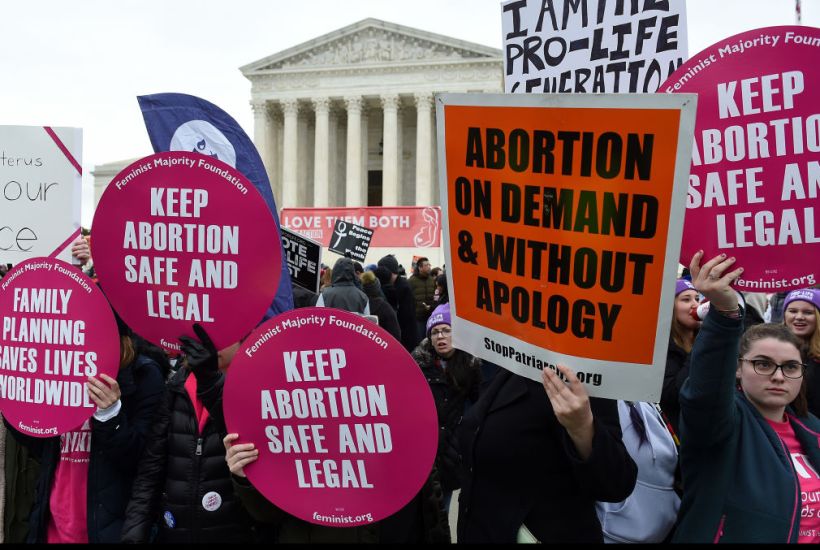A striking curiosity of American life is that the names of legal cases can insinuate themselves into everyday dialogue. None more so, of course, than Roe v Wade, the 1973 decision where a majority-liberal Supreme Court extracted from the Constitution’s protection of life, liberty and property a constitutional right to abortion: absolute in the first trimester, qualified in the second, and, in rare cases, even in the third. In a 1992 fine-tuning exercise, the rule was re-written as a right to abortion unless and until the foetus was viable at about 24 weeks. But the principle remains.
Southern and rural states always saw Roe v Wade as a liberal aberration. Three years ago, Mississippi, where public opinion remains obstinately pro-life, threw down the gauntlet. Its governor signed a law banning all abortion beyond 15 weeks, viable foetus or not, except in an emergency (or in the case of severe foetal abnormality). He hoped the courts would strike it down and give the chance for a more conservative Supreme Court to think again. The plan worked: the courts obliged, and the Supremes have now taken the case. We can expect a decision next year.
No-one knows what the Court will decide (though the smart money is on it simply bringing forward the time after which abortion can be forbidden). But even before the armies of well-paid lawyers accept their briefs and mount the Supreme Court steps, organisations like Planned Parenthood have condemned the court for taking the case at all. Christian LoBue of NARAL Pro-Choice America referred to ‘an ominous sign and an alarming reminder that the threat to the legal right to abortion is imminent and real.’
The scene is thus set for a kind of cultural Last Battle: on one side, reasonable progressive America; on the other, the southern rural states with their Bible-bashing pickup drivers. There’s only one problem. Whether you are pro-life or even strongly pro-choice, one thing should be clear: the progressives are in the wrong. If you believe in democracy and freedom, there are any number of reasons why you need to root for the demise of Roe v Wade.
First, even if the Supreme Court did dump the constitutional right to termination, this would not in itself prohibit a single abortion. Indeed, in many liberal states such as California, Connecticut, New York and New Hampshire there would be no effect at all, since their state law already permits terminations up to viability at about 24 weeks.
Abandoning Roe v Wade would merely return the political decision on abortion to voters in each individual state. True, a number of states would immediately take advantage: indeed, ten or so states already have so-called ‘trigger laws’ that would automatically do just that if the Supreme Court allowed it. A few older, more restrictive, state laws that have lain in suspended animation since Roe v Wade might be revived. But that would be the decision of their elected governments, not the Court’s.
Secondly, it is hard to see that returning the ultimate power of decision to the states would be anything but a benefit. Abortion is a matter of vital social policy. But no-one will ever win the argument on it to the satisfaction of the other side. If so, the obvious place for the controversy to play out is in the state political arena.
True, this would mean very different approaches in, say, conservative Alabama and hyper-liberal Oregon. But this is the very point of popular government, and indeed of the American polity (remember the Tenth Amendment: ‘The powers not delegated to the United States by the Constitution, nor prohibited by it to the States, are reserved to the States respectively, or to the people’).
Thirdly, if you believe in democracy, you ought to accept that if you wish your views to prevail you should have to persuade a majority to go along with it, rather than lobby an elite to impose it. Indeed, many people would say that was the precise object of the exercise. The howls of the pro-choicers at the Supreme Court’s preparedness to think again are really complaints at their loss of privileged status: at being told they will have to carry the fight to voters, rather than pursue it more comfortably on the steps of the Capitol, or in the pages of the Washington Post and university law reviews.
Fourth, even accepting the need for some constitutional limits on popular sovereignty, Roe v Wade is going pretty far. You don’t need to be a diehard constitutional originalist to see that wrenching a right to abortion from an obscure section on depriving people of life, liberty or property without due process – which is what Roe v Wade did – is highly tendentious. It is not a healthy sign when imprecise provisions like this are interpreted as giving a kind of roving commission to unelected judges to give what they see as vital values an end-run around the democratic process. If the Supremes were to reject such practices next year, it is hard to see the effects as anything other than good.
In the UK we can, of course, watch this drama develop from the sidelines. But we can’t afford to be too smug about it. On this side of the Atlantic, there are ominous signs of a similar mission creep in our human rights law, especially in the form of the open-ended protection of ‘private and family life’ in Article 8.
Tellingly, at roughly the same time as Mississippi was passing its own abortion law, our own Supreme Court was laying the groundwork for a finding that Article 8 could in the same way be expansively interpreted so as to give a right to abortion in certain cases.
For the moment, however, there remains a nice irony to savour. Three of the current US Supreme Court justices (Gorsuch, Kavanaugh and Barrett) are Trump appointees. For all the suggestions that he has been packing an unelected court with people in his image, it is quite conceivable this group will now help that same court to strike its biggest blow for popular democracy for something like 50 years.
Now, whatever you think about abortion, or Trump, that would be a legacy worth bragging about.
Got something to add? Join the discussion and comment below.
Get 10 issues for just $10
Subscribe to The Spectator Australia today for the next 10 magazine issues, plus full online access, for just $10.




















Comments
Don't miss out
Join the conversation with other Spectator Australia readers. Subscribe to leave a comment.
SUBSCRIBEAlready a subscriber? Log in